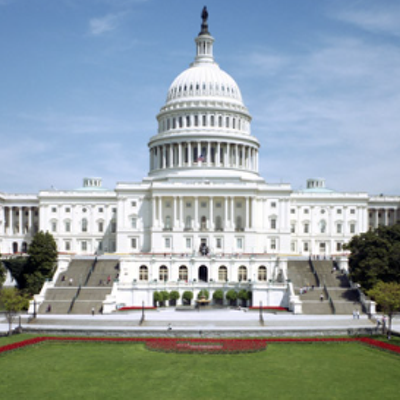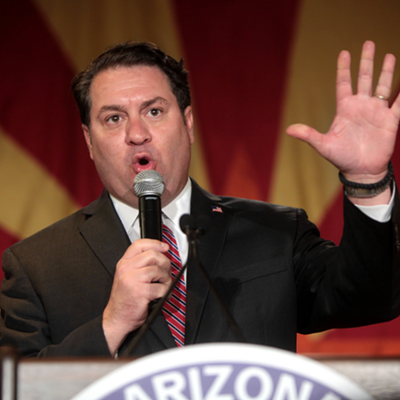Republican state lawmakers are once again taking aim at the initiative process this year.
Given that initiatives are generally end runs around the GOP majority that controls the Legislature, it's hardly surprising to see lawmakers deciding they don't want the people to have a chance to decide on new laws, no matter how popular they are. The initiative process, in which citizens gather enough signatures to force a statewide vote on a law, has been around since statehood and has often vexed legislators.
In recent election cycles, the initiative process has shifted the power to draw political boundaries from state lawmakers to an independent commission; created public financing for candidates for state office; made cockfighting a crime and gaven Arizona the medical marijuana program, among other laws.
But the one that seems to really have stuck in the craw of the Arizona Chamber of Commerce and other allies of GOP lawmakers was the hike in the minimum wage to $10 bucks an hour this year and up to $12 by 2020. Roughly 60 percent of the voters supported the minimum-wage increase last November, which demonstrates solid public support.
So now the Chamber is cheerleading a bunch of new laws meant to hamstring the initiative process. A few of them passed last week (with the help of Tucson's new Republican Rep. Todd Clodfelter, who delivered the deciding vote to move a package of bills through the House Government Committee). Among the proposals:
• HCR 2002, which would ask voters to repeal the Voter Protection Act. The Voter Protection Act was passed in 1998, in reaction to a decision by state lawmakers to completely repeal a medical marijuana initiative that had been passed by voters in 1996. The initiative made it next to impossible for lawmakers to amend initiatives by requiring a three-fourths majority of the Legislature to make any changes, and even then, the changes must "further the intent of the initiative." This restriction, as you can guess, hasn't sat well with most Republican lawmakers.
• HCR 2007, which is sort of a watered-down version of HCR 2002, in that it would ask voters to remove the shield of the Voter Protection Act for successful referendums placed on the ballot by lawmakers rather than by the public.
• HB 2255, which would prohibit out-of-state interests from making financial contributions to initiative campaigns. Critics of the legislation have pointed out that this is flat-out unconstitutional, but it passed anyway because Republican lawmakers' concern for the Constitution always fades when the sacred document gets in the way of their own agenda.
All three of the bills passed on party-line votes last Thursday, Feb. 9.
Two more initiative-related bills were scheduled for hearings this week, after the Weekly's print deadline.
HB2320 would require ballots to include a warning that each initiative "cannot be changed in the future if approved on the ballot except by a three-fourths vote of the Legislature and if the change furthers the purpose of the original ballot measure, or by referring the change to the ballot." Why the bill's sponsor, Rep. Michelle Ugenti (R-Scottsdale), thinks this will somehow deter voters from supporting a particular measure is anyone's guess.
But the biggest challenge to future initiatives is HB2404, sponsored by state Rep. Vince Leach (R-Oro Valley), which would strictly restrict who could collect signatures for ballot initiatives. Paid signature gatherers would have to take a special online class before they could go to work; they'd have to pass background checks and a variety of prior criminal or civil offenses would disqualify them from taking the job; they'd have to pay a fee to the state before starting work; and they could no longer be paid by the signature. On top of that, political organizations that use paid circulators could be on the hook for tens of thousands of dollars in fines if someone collecting signatures didn't meet of all those requirements. And there would be new reporting requirements to create hassles for anyone trying to get an initiative on the ballot.
There's a very good chance Leach's bill will pass and be signed by Gov. Doug Ducey. Sure, voters aren't likely to support weakening something called the Voter Protection Act, but Leach's bill doesn't need to go to the ballot to screw up the ability of Arizonans to counteract the Legislature.
Supporters of the initiative process could certainly run a referendum on Leach's bill to put it up to a vote of the people before the new rules are locked into law. But we've seen that play out before recently; when lawmakers came up with a terrible package of legislation meant to disenfranchise voters in 2013, there was enough outrage that opponents of the law were able to gather enough signatures to force a referendum. Before that could happen, though, lawmakers repealed the massive package of laws and then worked to pass them individually to diffuse the public outrage. Most of the provisions are now statute.
So even if there's a massive organizing effort to force a referendum, lawmakers could make a mockery of that with just a few legal tweaks here and there.
That's why initiative supporters should try a new tack: Passing a new package of initiative laws via the initiative process. This approach would have (at least) three benefits: It would offer an opportunity to strip out some of the amendments put into initiative law by legislators in past years to hamstring the process; it would outmaneuver the lawmakers who are currently trying to take away the power of initiative; and if passed, it would lock in the new rules in a way that state lawmakers couldn't mess with in the future.
It's not likely to be an easy lift, what with all the legal drafting and whatnot. But on the other hand, it would certainly be in the best interest of petition companies to give a deep discount on the signature-gathering costs. And if someone doesn't do this, it won't be long before we're wondering why we can't put anything on the ballot for voters to decide.
Zona Politics with Jim Nintzel airs Sunday afternoons at 5 p.m. on KXCI, 91.3 FM, and at 1 p.m. Saturdays and 10 a.m. Sundays on KEVT, 1210 AM. Nintzel also talks politics on The John C. Scott Show Thursday afternoons at 4 p.m. on KEVT, 1210 AM.







